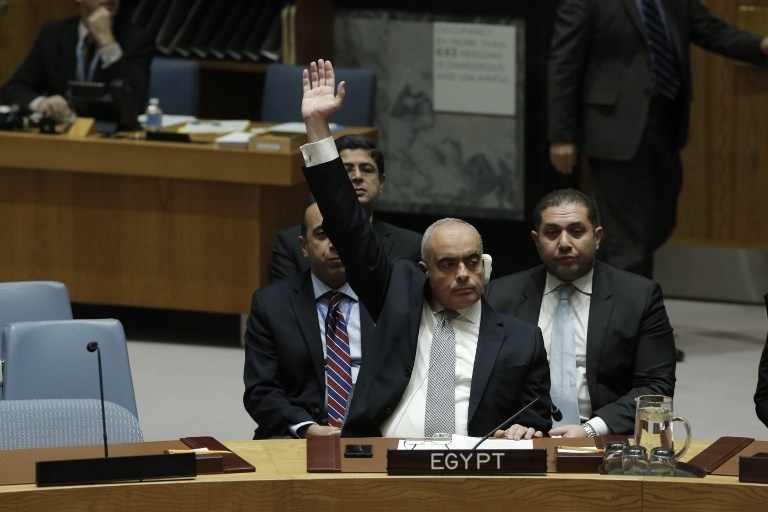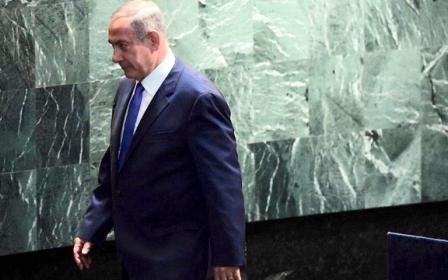Non-Arab states 'get' the Palestinian cause

Four non-Arab states sponsored the UN Security Council draft resolution that condemned Israeli settlement activities. This came after Egypt decided to withdraw the draft resolution. It even tried to obstruct it during the eventual voting process.
Israeli sources revealed what actually took place behind the scene, confirming that the Egyptian position changed after representations from the Israeli government and following a call Egyptian President Abdel Fattah al-Sisi took from US President-elect Donald Trump.
Had it not been for the four non-Arab states, the Egyptian regime would have succeeded in rescuing the Israelis and would have cost the Palestinians, the Arabs and the rest of the world an opportunity to denounce Israeli settlements, which today devour more than 42 percent of the land in the West Bank.
The rest of the world says the settlements are illegal, represent a violation of international law, and are an attempt to change the facts on the ground within an occupied land whose fate has for years been the subject of negotiations.
This is not the first time Arabs have been dealt a blow by Egyptian diplomacy. A few weeks ago, a crisis erupted between Riyadh and Cairo because the Egyptian UN envoy voted in favour of the Russian UN Security Council draft resolution over Syria which refused to stop the savage bombardment of Aleppo.
At the time, the Egyptian attitude enraged the Saudi envoy, who burst out in anger and said that the positions of Malaysia and Senegal were closer to the Arab position than the Egyptian position.
And here we have seen Senegal and Malaysia, in addition to New Zealand and Venezuela, sponsor the same draft resolution within just 24 hours of it being withdrawn by Egypt. Eventually, the UN Security Council approved the resolution with a majority of 14 votes out of a total of 15. None of the permanent members used the right of veto to foil the resolution, and the United States was content with abstaining.
There are a number of significant facts about the passing of Resolution 2334, which condemns Israeli settlements and calls on Israel to end all land-grabbing in the West Bank. Although the resolution does not meet all the Palestinian demands, it does, nevertheless, constitute an important shift with implications that cannot be ignored.
1. This resolution is the first of its kind for 36 years. The last failed attempt to obtain such a resolution occurred in 2011, when the US used its veto to kill the draft.
The world is witnessing a significant strategic change in dealing with the Palestinian issue. Israeli lies no longer deceive, and what the Israelis seek to promote is no longer believed. So the world’s approach toward Israel and its policies is changing gradually, especially with regard to settlements. The European Union has already decided to label Israeli settlements' products so that they are not treated in the same way as other Israeli products.
2. This resolution was sponsored by non-Arab states in four different continents. One of them, New Zealand, is geographically placed farthest away from the Arab region, which means that the Palestinian issue is no longer an issue for the Arabs alone but it has turned into a global issue.
3. Egyptian diplomacy has been a source of frustration for the Arabs for the second time in two months. This also explains how and why the Egyptian siege on Gaza continues, even more strictly than the Israeli siege itself. In the shadow of the current regime, Egypt has become Israel's most important ally in the region politically, militarily and in security.
4. Israel has received a major diplomatic setback. Lobbyists, pressure groups, the media and public relations companies that serve the Israeli state have also failed. The resolution affirmed Israel's true isolation in the international arena and exposed its policies which contravene international law.
The lesson here is that it is possible to stand up to Israeli pressure if there is a will and if the right time is chosen. This is a rare victory for the Palestinian cause, which cannot be underestimated. Yet, this remains a single step along the 1,000-mile road toward freedom and the regaining of rights.
5. There is no doubt that the resolution was a message Barack Obama was sending to Israel's prime minister, Benjamin Netanyahu. The resolution is a belated response from the outgoing US president to the repeated insults and plots Netanyahu had engaged in against the first black president of the US.
Obama launched his presidency with big hopes that he would be able to resolve the Palestinian problem. Halting settlement building was the main item on his agenda. Netanyahu aborted Obama's project. In conspiring against Obama, Netanyahu went as far as supporting the Republican presidential candidate Mitt Romney against Obama in the presidential elections of 2012. He also incited against him overtly and covertly inside the US Congress.
Obama also had a message for his successor, Donald Trump, who attempted to foil the resolution by phoning Sisi. Obama was saying that he was going to act as president, in whom full authority is vested, until the very last minute of his tenure. Obama also wanted to affirm his continued personal commitment to what he proposed but failed to accomplish in his early days as president.
However, the question remains: why did Obama veto such a resolution in the early days of his presidency? Perhaps had he done it right in the beginning, the Middle East and its principal conflict would have been in a different situation today. His presidency was fatally flawed with hesitation. The long march from the Middle East has been the predominant feature of Obama's eight years. This should not in any way belittle the importance of the resolution even if it came late in the day; better late than never.
The UN Security Council resolution represents a significant strategic development despite the fact that in essence it falls short of meeting all the ambitions of the Palestinian people and does not achieve for them their full rights. The Israelis will just ignore it.
Nevertheless, it does in any case represent a tough defeat for the Israeli media and political machine and constitutes a new shift in the path of the Palestinian issue, as it takes it out of its restricted Arab framework so as to prove that it is today a central issue for the entire world.
More importantly, Arabs and Palestinians need to understand that they cannot depend on their leaders. The countries that were furthest away geographically became closer ethically and humanely to the Palestinian cause while the key Sunni Arab regimes have now become detached from that cause.
Mohammad Ayesh is an Arab journalist currently based in London.The views expressed in this article belong to the author and do not necessarily reflect the editorial policy of Middle East Eye.
The views expressed in this article belong to the author and do not necessarily reflect the editorial policy of Middle East Eye.
Photo: Amr Abdel Latif Aboulatta, Permanent Representative of Egypt to the UN, votes in favor during the December 23, 2016, vote on Israeli settlements (AFP).
New MEE newsletter: Jerusalem Dispatch
Sign up to get the latest insights and analysis on Israel-Palestine, alongside Turkey Unpacked and other MEE newsletters
Middle East Eye delivers independent and unrivalled coverage and analysis of the Middle East, North Africa and beyond. To learn more about republishing this content and the associated fees, please fill out this form. More about MEE can be found here.





